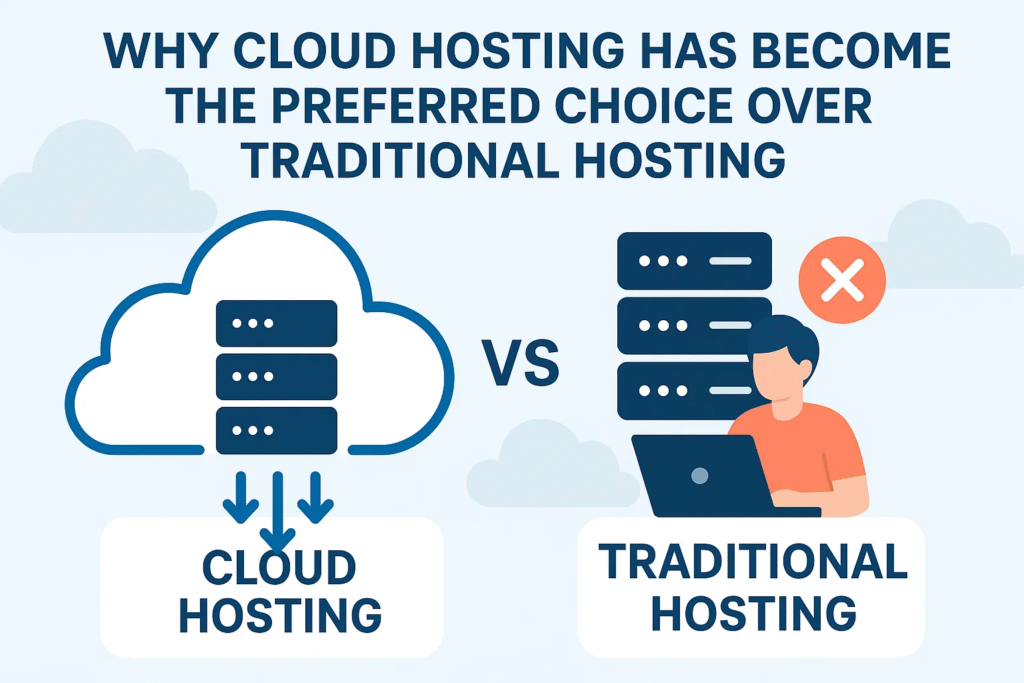In today’s digital era, website performance and reliability are no longer just technical terms—they are the lifelines of any online business. Whether you’re running a small personal blog or managing a full-scale e-commerce platform, your website’s hosting environment plays a decisive role in its success.
Traditionally, websites were hosted on physical servers using shared or dedicated hosting. However, with the evolution of technology and the rise of cloud computing, businesses are rapidly moving to cloud hosting — a more flexible, scalable, and cost-efficient solution.
But what exactly makes cloud hosting the preferred choice over traditional hosting? Let’s explore the key reasons in detail.
☁️ What is Cloud Hosting?
Cloud hosting is a web hosting model where your website’s data is stored across multiple interconnected servers instead of a single physical machine. These servers work together to balance load, ensure uptime, and deliver resources on demand.
Think of it as a network of computers (the “cloud”) working in sync to provide storage, speed, and reliability.
When one server fails, another instantly takes over—ensuring zero downtime.
🖥️ What is Traditional Hosting?
In traditional hosting, websites are hosted on a single physical server. All resources like RAM, CPU, and storage are allocated from that single server.
This includes:
-
Shared hosting (multiple websites on one server)
-
VPS hosting (virtual partitions on one physical server)
-
Dedicated hosting (a full server for one user)
While this setup has worked for years, it comes with limitations — such as scalability issues, downtime risk, and performance bottlenecks.
🧩 Cloud Hosting vs. Traditional Hosting — A Quick Comparison
Below is a detailed comparison table highlighting the major differences between cloud hosting and traditional hosting.
| Feature | Cloud Hosting | Traditional Hosting |
|---|---|---|
| Server Infrastructure | Multiple interconnected servers (virtual network) | Single physical server |
| Scalability | Easily scalable up or down based on needs | Limited scalability; requires hardware upgrades |
| Performance | High performance with load balancing | Performance depends on server capacity |
| Downtime | Minimal or no downtime | High downtime if server fails |
| Security | Advanced data redundancy & encryption | Basic security, prone to physical damage |
| Cost Structure | Pay-as-you-go model | Fixed monthly or yearly plans |
| Backup & Recovery | Automatic and frequent backups | Manual or limited backup options |
| Flexibility | High flexibility for traffic surges | Limited; needs manual intervention |
| Maintenance | Managed by cloud provider | Needs manual maintenance or paid support |
| Best For | Businesses with fluctuating traffic, growth needs | Static websites or small personal blogs |
⚙️ How Cloud Hosting Works
Cloud hosting works on a virtualization principle. A central software layer (called the hypervisor) divides physical resources into multiple virtual servers. These virtual machines are then distributed across several data centers.
Whenever your website needs more resources—say, during a traffic spike—additional servers automatically provide the necessary power.
Once the traffic normalizes, those resources are freed up again.
This automatic resource allocation is one of the biggest advantages of cloud hosting over traditional systems.
🚀 1. Superior Performance and Speed
Performance is the cornerstone of online success. A delay of even one second in page loading can reduce conversions by up to 7%.
Cloud hosting enhances speed through:
-
CDNs (Content Delivery Networks) that distribute content globally
-
SSD storage for faster data retrieval
-
Load balancing to prevent any single server from being overwhelmed
Unlike traditional hosting—where your website’s performance can be dragged down by other users—cloud hosting guarantees consistent and optimized speed.
🧠 2. Unmatched Scalability
With traditional hosting, scaling your website means upgrading to a new plan or moving to a new server—often requiring downtime and technical setup.
Cloud hosting eliminates this problem by providing on-demand scalability.
You can easily:
-
Add more storage
-
Increase bandwidth
-
Handle high-traffic events (like product launches or holiday sales)
All this happens automatically, ensuring your website runs smoothly even under heavy load.
🛡️ 3. Better Security & Data Protection
Data security is a growing concern for all online businesses.
Cloud hosting providers use multi-layered security protocols, including:
-
Firewalls
-
Data encryption
-
Intrusion detection systems
-
Regular vulnerability scanning
In case of any hardware failure, data redundancy ensures that your files are instantly backed up and restored.
Traditional hosting, however, relies heavily on manual backup and often lacks real-time recovery mechanisms.
💸 4. Cost Efficiency
Traditional hosting typically locks you into fixed pricing plans, whether you use all resources or not.
Cloud hosting, on the other hand, works on a pay-as-you-use model. You only pay for the resources you consume — making it budget-friendly for startups and scalable for enterprises.
Additionally, there’s no need for physical server maintenance or upgrades, saving operational costs.
🔄 5. High Reliability & Uptime
One of the biggest pain points of traditional hosting is downtime.
If the physical server goes down due to technical failure or overload, your website becomes inaccessible.
Cloud hosting solves this with redundant servers and failover systems.
If one server fails, another instantly replaces it, ensuring 99.99% uptime and uninterrupted accessibility.
🧰 6. Easy Maintenance and Automation
With cloud hosting, maintenance becomes a hands-off process.
The hosting provider automatically manages:
-
Software updates
-
Hardware upgrades
-
Security patches
-
Performance optimization
In contrast, traditional hosting often requires manual monitoring, which can lead to performance degradation over time.
🌍 7. Global Reach and Availability
Cloud hosting leverages data centers located around the world.
This means your website content can be delivered from the nearest server to the visitor, reducing latency and improving load speed.
For businesses targeting global audiences, this is a huge advantage.
Traditional hosting, however, is geographically limited to one or two server locations.
🔄 8. Seamless Backup and Disaster Recovery
Unlike traditional hosting—where backups are manual and often ignored—cloud hosting offers automatic backups.
Your data is continuously mirrored across multiple servers and regions.
So, even if one data center experiences a technical glitch, your website remains live and recoverable.
This built-in disaster recovery feature ensures business continuity — an essential factor for e-commerce, fintech, and SaaS companies.
💬 9. Environmentally Friendly Hosting
Cloud hosting is more energy-efficient compared to traditional setups.
Because it optimizes server utilization and reduces idle resources, it consumes less energy overall.
Many cloud providers are also investing in green data centers, powered by renewable energy sources, aligning with modern sustainability goals.
🧑💼 10. Perfect for Remote and Growing Businesses
The shift to cloud hosting aligns perfectly with today’s remote and hybrid business models.
Team members can access hosting dashboards, analytics, and file systems from anywhere in the world.
This flexibility supports collaboration and remote management — something that’s nearly impossible with traditional server-based setups.
💻 11. Enhanced Control and Customization
Modern cloud hosting platforms offer intuitive dashboards that let you:
-
Monitor resource usage
-
Scale servers instantly
-
Manage domains and databases
-
Set up automated tasks
Traditional hosting, on the other hand, limits customization to basic cPanel operations, restricting advanced control.
📊 Case Study Example: How a Business Benefits from Cloud Hosting
Imagine an e-commerce brand that experiences a surge of traffic during festive sales.
On a traditional hosting plan, this spike might:
-
Slow down the website
-
Crash the server
-
Cause lost sales
But with cloud hosting, the system automatically adds more resources, manages the load, and keeps the store running smoothly.
Once the sale ends, resources scale back — saving costs and maintaining efficiency.
📋 Summary Table — Key Advantages of Cloud Hosting
| Advantage | Description | Impact on Business |
|---|---|---|
| Scalability | Instantly adjust server resources | Supports business growth |
| Speed & Performance | Uses multiple servers & CDN | Faster load times |
| Cost Efficiency | Pay only for what you use | Saves operational expenses |
| Security | Multi-layer protection & redundancy | Protects sensitive data |
| Reliability | Near-zero downtime | Continuous website availability |
| Automation | Automatic updates & maintenance | Reduces manual work |
| Global Access | Multiple data centers worldwide | Better reach for users |
| Eco-Friendly | Optimized energy use | Reduces carbon footprint |
🧩 Cloud Hosting Use Cases
Cloud hosting suits a wide range of users:
-
Startups needing flexible resources
-
E-commerce websites expecting traffic spikes
-
Media and entertainment platforms handling large files
-
SaaS companies offering online services
-
Developers and agencies hosting multiple client sites
Whether you’re hosting a single website or managing hundreds, cloud hosting adapts to your operational demands seamlessly.
🧠 Future of Cloud Hosting
As technology advances, cloud hosting is evolving into an AI-driven, automated infrastructure.
Emerging trends include:
-
Edge computing for faster content delivery
-
Serverless architecture to minimize resource waste
-
AI-based monitoring for predictive maintenance
-
Hybrid cloud setups combining private and public clouds
These developments ensure that cloud hosting remains the foundation of the modern web.
🏁 Conclusion
The shift from traditional hosting to cloud hosting is not just a passing trend — it’s a fundamental transformation in how the web operates.
With speed, scalability, flexibility, and cost-efficiency, cloud hosting has proven itself as the preferred choice for individuals and businesses alike.
As online competition intensifies, having a reliable, secure, and future-ready hosting environment is no longer optional—it’s essential.
So, if you’re planning to start or upgrade your website, cloud hosting is the smarter, faster, and more sustainable path forward.


